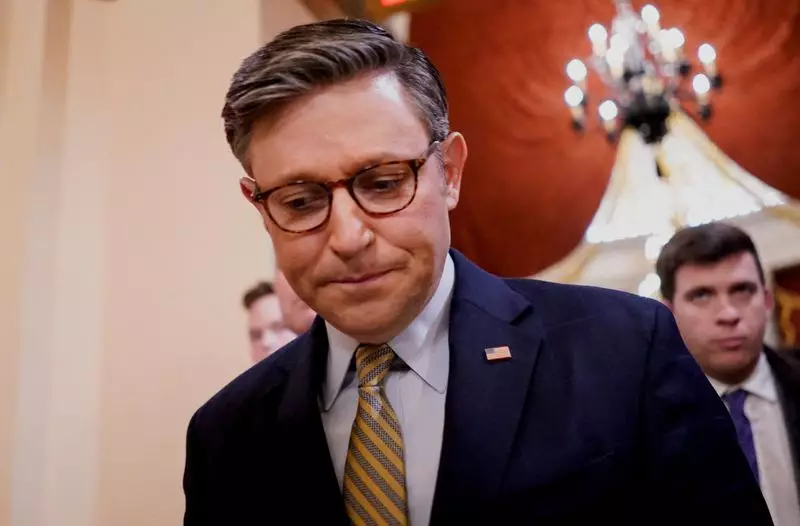The passing of legislation by the Republican-controlled House of Representatives marks a crucial moment in U.S. politics, specifically amid economic uncertainties and government budgeting challenges. On a recent Friday, under the weight of pressing deadlines, the House voted to prevent a looming government shutdown. However, the complexities of the bill, along with the varying interests among stakeholders, reflect the intricate dance of power, economic strategy, and political maneuvering that characterizes contemporary governance in America.
Key Legislative Actions and Economic Considerations
The newly passed measure, which aims to sustain government funding until March 14, serves multiple purposes, primarily shielding essential services from interruption. The bill includes provisions for $100 billion designated for disaster relief in states stricken by calamities and another $10 billion earmarked for agricultural support. These allocations are critical, especially for regions grappling with the aftermath of natural disasters and farmers facing financial strain. However, notable in its absence is an increase in the debt ceiling, a point that attracted considerable attention and debate, particularly in the context of the incoming Republican administration under President-elect Donald Trump.
House Speaker Mike Johnson emphasized that this legislative step is strategic, positioning Republicans to exert greater influence over fiscal decisions when they seize control of both congressional chambers early in the year. This perspective reveals a tactical layering not just in immediate funding needs but in longer-term economic strategy, suggesting Republicans are reserving their broader goals for when they can pursue them with full backing from the presidency.
The stakes of a government shutdown cannot be overstated. The repercussions extend beyond the political arena, impacting millions of Americans through stalled federal operations ranging from law enforcement agencies to national parks. Affected sectors, particularly travel and tourism, stand to lose substantially during peak seasons, with estimates suggesting potential losses escalating to $1 billion per week. Such financial fallout presents a stark reminder of how governance shapes everyday lives and the economy at large.
The bipartisan vote, wherein the bill was passed 366-34, underscores a sentiment within Congress to prioritize stability over partisanship in challenging times. Yet, the swift modifications in response to Trump’s revelations about his agenda—predicated on cutting expenses and limiting the scope of government—highlight the tug-of-war in legislative priorities. This act of revising the initial proposal, initially viewed as a balanced bipartisan agreement, represents the frailty of policy agreements in an environment sensitive to external pressures, including significant figures in business and politics.
The integration of agendas, whether through the influence of prominent figures such as Elon Musk or through the partisan debates among legislators, reveals the often chaotic nature of U.S. governance. Musk’s apparent backing of the revised legislation, which he deemed more manageable, and his advisory role—even without an official governmental position—galvanize the narrative around how business interests intersect with political decisions. This fusion raises questions about the implications for policy-making integrity, particularly as Musk’s own business expansion in China was brought to light during discussions.
The response from House Democratic Leader Hakeem Jeffries acknowledges some victories in the passing of the bill, including the critical relief funds while simultaneously cautioning about further confrontations as the new year unfolds. His comments encapsulate a broader sentiment of cautious optimism among Democrats, even while facing stiff disagreements on fiscal policy, particularly concerning Trump’s insistence on increasing the debt ceiling—an element clearly rejected in the recent deliberations.
Fiscal Policy and the Path Ahead
Critics, including members of Trump’s Republican base and fiscal conservatives, express concern that without meaningful adjustments to fiscal policy, the nation may drift further into debt. The rising federal debt, currently exceeding $36 trillion, is a significant concern as Congress must renew its borrowing authority soon. The debt ceiling issue looms large, especially as the federal government has consistently expanded its spending, and previous confrontations on debt limits have historically unsettled financial markets.
As the political landscape shifts with the new Republican majority incoming, lawmakers face dual pressures: addressing immediate financial needs while re-evaluating long-term fiscal strategies. The balancing act between pushing through requisite aid amid ongoing economic challenges and confronting the underlying fiscal trajectory—one where voices in Congress advocate for more deliberate governmental spending and fiscal accountability—will shape the legislative agenda well into the future.
The recent legislative activity in Congress illustrates the complexities of governance beyond mere budget decisions. It reflects a broader narrative of conflicting interests, economic realities, and the intricate subtleties of current U.S. political life as leaders prepare for new challenges and opportunities in the months ahead.

